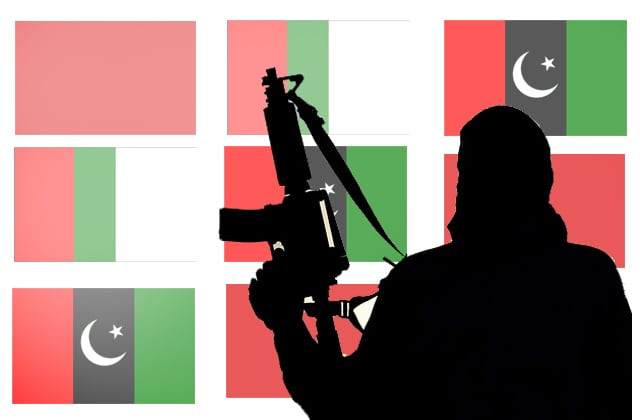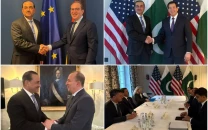Analysis: Terrorists do not favour any party
Surge in terror casualties disproves the notion that TTP is soft on PML-N and PTI.

Surge in terror casualties disproves the notion that TTP is soft on PML-N and PTI.
A comparison of statistics for the months of May and June makes it abundantly clear that violence under various covers continues to take lives – regardless of who governs the country. The number of deaths from violence during the month of May was as high as 634. In June these casualties declined slightly to 619 (compared to roughly 500 deaths off violence in April).
The surge in casualties of various acts of terror in May and June also disproves the widely-held notion that the terrorist syndicates led by Tehreek-e-Taliban Pakistan (TTP) were soft on the Pakistan Muslim League-N and the Pakistan Tehreek-e-Insaf (PTI). Much before the May 11 general elections, various socio-political segments of society – led by PPP and ANP - pilloried these two parties for being pro-Taliban for the simple reason that these two parties favoured dialogue with militants.
But the painstakingly collected data compiled by the Centre for Research and Security Studies (CRSS) clearly belies these notions and point to an altogether different reality i.e. subversion and terrorism disguised in ethnicity, nationalism and religiosity continue to consume precious lives and piling socio-economic misery on multiple flashpoints inside Pakistan.
Karachi, for instance, topped the list of incidents and deaths in May and June, with 210 and 222 casualties in the two months respectively.
Fata lost 182 and 101 people in the two months respectively, while for Khyber-Pakhtunkhwa these figures stood at 134 and 146 respectively.
Cumulatively, the human loss in FATA and K-P (northwestern regions) in May recorded 283 deaths and 280 in June – a whopping 563 for the two months.
The story of Balochistan is not different either; at least 88 deaths in May and 126 in June – mostly in suicide attacks targeting Shia Muslims, civilians and paramilitary personnel and installations.
Based on the trends of the past two months, one can easily conclude that the terror campaign from the north-northwest to the south-southwest hardly discriminates between which party is ruling which part of the country. Terrorists don’t seem to be drawing any distinction between the pro and anti parties, borne out by the fact that two PTI-affiliated members of parliament also became victims of this violence, as well as 24 JUI-F activists in attacks on election rallies.
This empirical evidence, therefore, calls for an extremely careful and comprehensive scrutiny before passing a judgment on the violence that has been sweeping the country. It has most probably also dawned on both the PML-N and the PTI, and that is why hardly does anybody speak of talking to the TTP anymore.
Of course, internal socio-political discord, grievances, institutional inefficiencies, cold-war era policies that relied on non-state actors as instruments of foreign policy, inter alia, have played havoc with Pakistan. Much of the mess flows from these factors, which apparently are also being exploited by external dynamics - geo-political extra-territorial power politics.
Pakistan is clearly caught up in the consequences of a proxy war it had supported in Indian Kashmir, and its support to Afghan mujahideen and Taliban.
But of course it takes two to tango, and other actors are part of this proxy war too; while Pakistan needs to address Indian reservations about the “India-focused terrorist infrastructure on its soil”, India itself cannot and must not pretend innocence either. If its agencies are not in “hot pursuit” inside Pakistan, then are not doing their job. Agencies of both countries, in fact also of Afghanistan, need to back down from their current levels and come clean on whatever they are doing to one another’s interests. This means demonstrably satisfying one another of sincere and concrete steps to de-escalation in the proxy war.
As for Pakistan, any security strategy will have to, not only fix symptoms, but also consciously address internal causes, ie, policies that are open to exploitation by external factors.
Published in The Express Tribune, July 12th, 2013.



















COMMENTS
Comments are moderated and generally will be posted if they are on-topic and not abusive.
For more information, please see our Comments FAQ